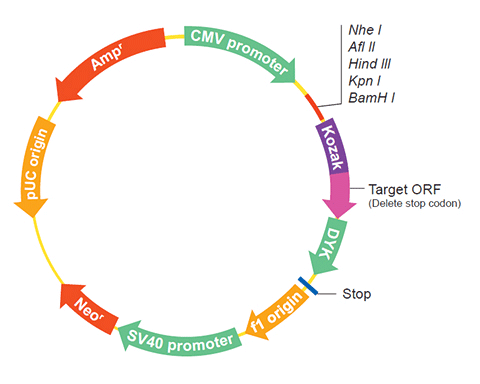| Gene Symbol | LOC100490788 |
| Entrez Gene ID | 100490788 |
| Full Name | trypsin-3-like |
| Gene Type | protein-coding |
| Organism | Xenopus tropicalis(tropical clawed frog) |
HOME
ORF » Species Summary » Xenopus tropicalis » LOC100490788 cDNA ORF clone
| Gene Symbol | LOC100490788 |
| Entrez Gene ID | 100490788 |
| Full Name | trypsin-3-like |
| Gene Type | protein-coding |
| Organism | Xenopus tropicalis(tropical clawed frog) |
| mRNA | Protein | Name |
|---|---|---|
| NM_001346571.1 | NP_001333500.1 | trypsin-3-like precursor |

| Xenopus tropicalis (tropical clawed frog) | LOC101731318 | XP_004920346.1 |
| Xenopus tropicalis (tropical clawed frog) | klk15 | NP_001011435.1 |
| Xenopus tropicalis (tropical clawed frog) | LOC496746 | NP_001011293.1 |
| Xenopus tropicalis (tropical clawed frog) | LOC496697 | NP_001011251.1 |
| Xenopus tropicalis (tropical clawed frog) | LOC100498532 | XP_004912073.1 |
| Xenopus tropicalis (tropical clawed frog) | LOC100489438 | XP_002941080.1 |
| Xenopus tropicalis (tropical clawed frog) | prss3 | NP_001004941.1 |
| Xenopus tropicalis (tropical clawed frog) | prss1 | NP_001011204.1 |
| Xenopus tropicalis (tropical clawed frog) | LOC100490788 | XP_002941088.2 |

The genome of the Western clawed frog Xenopus tropicalis.
Hellsten U, Harland RM, Gilchrist MJ, Hendrix D, Jurka J, Kapitonov V, Ovcharenko I, Putnam NH, Shu S, Taher L, Blitz IL, Blumberg B, Dichmann DS, Dubchak I, Amaya E, Detter JC, Fletcher R, Gerhard DS, Goodstein D, Graves T, Grigoriev IV, Grimwood J, Kawashima T, Lindquist E, Lucas SM, Mead PE, Mitros T, Ogino H, Ohta Y, Poliakov AV, Pollet N, Robert J, Salamov A, Sater AK, Schmutz J, Terry A, Vize PD, Warren WC, Wells D, Wills A, Wilson RK, Zimmerman LB, Zorn AM, Grainger R, Grammer T, Khokha MK, Richardson PM, Rokhsar DS
Science (New York, N.Y.)328(5978)633-6(2010 Apr)
Genetic and genomic tools for Xenopus research: The NIH Xenopus initiative.
Klein SL, Strausberg RL, Wagner L, Pontius J, Clifton SW, Richardson P
Developmental dynamics : an official publication of the American Association of Anatomists225(4)384-91(2002 Dec)
GeneRIFs: Gene References Into Functions What's a GeneRIF?
The following LOC100490788 gene cDNA ORF clone sequences were retrieved from the NCBI Reference Sequence Database (RefSeq). These sequences represent the protein coding region of the LOC100490788 cDNA ORF which is encoded by the open reading frame (ORF) sequence. ORF sequences can be delivered in our standard vector, pcDNA3.1+/C-(K)DYK or the vector of your choice as an expression/transfection-ready ORF clone. Not the clone you want? Click here to find your clone.
| CloneID | OXa47172 | |
| Clone ID Related Accession (Same CDS sequence) | NM_001346571.1 | |
| Accession Version | NM_001346571.1 Latest version! | Documents for ORF clone product in default vector |
| Sequence Information | ORF Nucleotide Sequence (Length: 750bp) Protein sequence SNP |
|
| Vector | pcDNA3.1-C-(k)DYK or customized vector |  User Manual User Manual |
| Clone information | Clone Map |  MSDS MSDS |
| Tag on pcDNA3.1+/C-(K)DYK | C terminal DYKDDDDK tags | |
| ORF Insert Method | CloneEZ™ Seamless cloning technology | |
| Insert Structure | linear | |
| Update Date | 2019-12-21 | |
| Organism | Xenopus tropicalis(tropical clawed frog) | |
| Product | trypsin-3-like precursor | |
| Comment | Comment: VALIDATED REFSEQ: This record has undergone validation or preliminary review. The reference sequence was derived from EL666123.1 and DT440895.1. On Oct 20, 2016 this sequence version replaced XM_002941042.3. ##Evidence-Data-START## Transcript exon combination :: EL717764.1, DT442060.1 [ECO:0000332] ##Evidence-Data-END## | |
1 | ATGATGCCTC TCTGGGTACT GATGTTCCTG GCAGTTGCAG CTGCTGCTCC TCTGGATGAT |
The stop codons will be deleted if pcDNA3.1+/C-(K)DYK vector is selected.
| RefSeq | NP_001333500.1 |
| CDS | 37..786 |
| Translation |

Target ORF information:
Target ORF information:
|
 NM_001346571.1 NM_001346571.1 |

1 | ATGATGCCTC TCTGGGTACT GATGTTCCTG GCAGTTGCAG CTGCTGCTCC TCTGGATGAT |
The stop codons will be deleted if pcDNA3.1+/C-(K)DYK vector is selected.
The genome of the Western clawed frog Xenopus tropicalis. |
Genetic and genomic tools for Xenopus research: The NIH Xenopus initiative. |